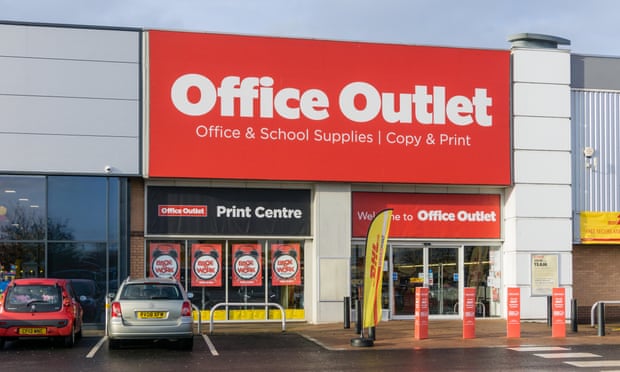Office Outlet Goes into Administration
Originally published at The Guardian.
Office Outlet is latest retailer to go into administration
 The stationery chain Office Outlet has collapsed into administration, putting 1,200 UK jobs at risk.
The stationery chain Office Outlet has collapsed into administration, putting 1,200 UK jobs at risk.
The struggling retailer, formerly known as Staples, has 90 stores, predominantly in out-of-town retail parks. Its collapse comes less than a year after its management team resorted to a company voluntary arrangement (CVA) to jettison unwanted stores and slash its rent bill.
Deloitte partner Richard Hawes, who is overseeing the administration, said Office Outlet had suffered as a result of falling stationery sales as well as the wider malaise on the high streets.
Hawes said: “We are hopeful a buyer can still be found for the business in the coming weeks and we will continue to trade the business with that aim in mind.”
The rival stationery chain Paperchase has also embarked on a CVA blamed on the cocktail of woes afflicting retailers, including fewer shoppers visiting the high street as well as increased rents and business rates. With 145 stores Paperchase wants landlords to agree to cut the rents on 98 of its 145 branches, the worst performing 28 of which are vulnerable to closure if their performance does not improve after three months.
The British Staples chain was cut adrift by its eponymous American parent in 2016 and was taken on by Hilco, the restructuring firm which also owned HMV prior to last year’s collapse, for a nominal sum.
Office Outlet, which also offers copy and print services, suffered a reduction in credit from suppliers, which had “severely impacted” the financial position of the company, added Dawes.
Last summer Hilco used a CVA to close four stores ahead of a sale to the management team, led by chief executive Chris Yates. He said the turnaround had succeeded in reducing losses but they had been unable to secure the additional funds required to finance the next stage of the business’s overhaul.
“Despite being highly impressed by the Office Outlet story, potential investors have held back due to retail sector sentiment and the general level of uncertainty,” Yates said.




Leave a Comment
Want to join the discussion?Feel free to contribute!